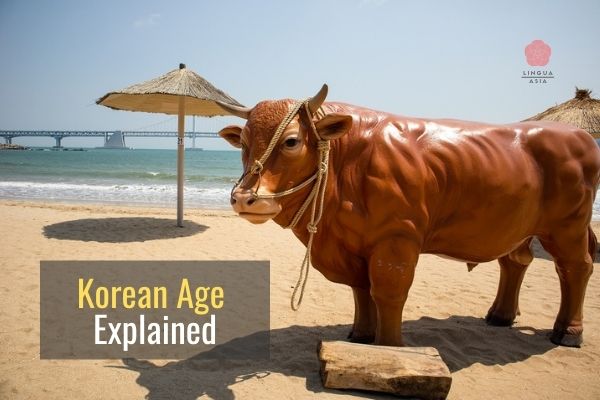Want to know how Korean age works?
This post includes:
- simple ways to figure out your age
- Korean age calculator
I’ve spent hours explaining Korean age to non-Koreans.
Here’s the simplest explanation I can come up with!

Quick Summary
- In South Korea, everyone is 1 year old when they’re born since time spent in the womb counts.
- Everyone ages 1 year on January 1st.
- Despite being abolished, people still use Korean age.
Definitions
International age: The age you are now according to being 0 years old at birth and having a fixed birthday based on the solar calendar. Koreans also call this “만나이 (mahn nayi)”.
Korean age: The age you are according to being 1 year old at birth and adding 1 year to your age on New Year’s Day, January 1st.
※Update※
As of June 28, 2023, Korea will no longer use Korean age. Instead, it will use international age as in “mahn nayi”. We get to be younger by 1-2 years!
The age rules for kids starting elementary school, freshmen at university drinking/smoking, and Korean men serving in the military will remain the same as before!
Koreans still use Korean age in their daily lives though.
How does Korean age work?
Age is calculated differently in Korea and is complicated for these reasons:
- Everyone is 1 year old when they’re born since time spent in the womb counts.
Example: A baby born on December 31st 2021 will be 1 year old in 2021.
- Everyone ages 1 year on New Year’s Day, January 1st.
Example: A baby born on December 31st 2021 will be 2 years old on January 1st 2022 the very next day! That’s what I call premature aging.
Easy ways to calculate your Korean age

Quick way:
When trying to figure out your Korean age, think of yourself as one year older than you actually are. This will be correct in most cases.
Example: if you’re 25 in international age, then you’re 26 in Korean age.
Accurate way:
- If your birthday has passed this year, your Korean age will be your international age plus 1.
Example: if you’re 25 in international age, then you’re 26 in Korean age.
- If your birthday hasn’t passed this year, your Korean age will be your international age plus 2.
Example: if you’re 25 in international age, then you’re 27 in Korean age.
If you can handle these, you’re doing great!
Insider Tips
- When you’re not sure how to address someone, compare birth years instead by asking “몇년생이세요? (myut-nyun-saeng-yi-seh-yo?)” to get a quick idea of what to call someone.
- Older people might ask “무슨 띠에요? (mu-seun-tti-eh-yo?)”, meaning “What’s your Zodiac sign?”. You can answer “___ 띠에요. (___ tti-eh-yo).” For example, “yong-tti-eh-yo (I’m Dragon sign”).
Korean age calculator
This calculator lets you figure out your Korean age by birth year and date. It’s the most accurate one I could find without having to code.
*** Update 2023***
Korean age will be abolished, at least on official documents, from June 2023. Korean Parliament voted in December 2022 to adopt the standard international age that most of the world uses.
Good news for Koreans, they’re about to get a year or two younger!
Whether this will affect the social hierarchy based on age remains to be seen.
Interesting facts about Korean age
- Age is a big deal in Korea, it determines how you treat and address others.
- Korean people will often ask how old you are within the first few minutes of meeting you.
- Koreans have “빠른년생 (ppareun nyunsaeng)” literally meaning “born early”, for those who were born in between January 1st to February 28th. These people used to enroll in elementary school one year earlier, so they’re known as “jokbo breaker (족보 브레이커 or hierarchy breaker)” that complicate relationships. Recently, they changed the law to get rid of this problem.
- Koreans sometimes ask which year you started your undergrad (몇 학번이세요?) or which year you were born (몇년생이세요?). 빠른년생 complicate these questions, so they always make sure to mention they’re “ppareun 90 (year born)” or something along those lines.
- Some families choose to celebrate lunar birthdays. (I celebrate both!)
- My parents generation and older believe that the lunar calendar is more accurate, since weather starts to get colder after Chuseok (추석 or Korean Thanksgiving).
- However, at the hospital, Koreans use international age, called “만나이 (mahn nayi)”. It’s used as 만 20세 (20 years old).
How to address Koreans you don’t know respectfully
Showing enough respect when talking to someone is a major hurdle for Korean language learners.
You don’t use the equivalent of “you”, which would be “너” or “당신”, because that would be rude.
In most situations, you can use these kinship terms:
- oppa – older brother (if you’re female)
- hyung – older brother (if you’re male)
- noona – older sister (if you’re male)
- unnie – older sister (if you’re female)
- ajeossi – non-biological uncle
- ajumma – non-biological auntie
- emo – aunt on mother’s side
- samchon – uncle on both sides
There are two levels of kinship terms, plain and honorific.
The suffix “-nim” is the most common way to make a word honorific. You can add this to most titles and kinship terms.
For example, you can use “emo-nim (이모님)” when addressing a cleaning lady or babysitter. (In Korea, they’re usually middle-aged women and appreciate the respect.)
No need to worry though, because Koreans will understand if you mess up.

FAQ
What’s the Difference between Korean Age vs American Age
Korean age is calculated a little differently from American age or international age. The simplest way to calculate Korean age is to take your American age and add one year.
Subscribe for
exclusive info on Korea
Did we miss anything?
Let us know your thoughts on Korean age in the comments!



